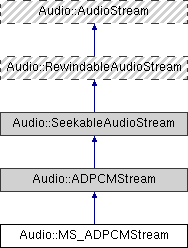|
|
| MS_ADPCMStream (Common::SeekableReadStream *stream, DisposeAfterUse::Flag disposeAfterUse, uint32 size, int rate, int channels, uint32 blockAlign) |
| |
| virtual bool | endOfData () const |
| |
| virtual int | readBuffer (int16 *buffer, const int numSamples) |
| |
|
| ADPCMStream (Common::SeekableReadStream *stream, DisposeAfterUse::Flag disposeAfterUse, uint32 size, int rate, int channels, uint32 blockAlign) |
| |
| virtual bool | isStereo () const |
| |
| virtual int | getRate () const |
| |
| virtual bool | rewind () |
| |
| virtual bool | seek (const Timestamp &where) |
| |
| virtual Timestamp | getLength () const |
| |
| bool | seek (uint32 where) |
| |
| virtual bool | endOfStream () const |
| |
◆ endOfData()
| virtual bool Audio::MS_ADPCMStream::endOfData |
( |
| ) |
const |
|
inlinevirtual |
Check whether end of data has been reached.
If this returns true, it indicates that at this time there is no data available in the stream. However, there might be more data in the future.
This is used by e.g. a rate converter to decide whether to keep on converting data or to stop.
Reimplemented from Audio::ADPCMStream.
◆ readBuffer()
| virtual int Audio::MS_ADPCMStream::readBuffer |
( |
int16 * |
buffer, |
|
|
const int |
numSamples |
|
) |
| |
|
virtual |
Fill the given buffer with up to numSamples samples.
Data must be in native endianness, 16 bits per sample, signed. For stereo stream, the buffer will be filled with interleaved left and right channel samples, starting with the left sample. Furthermore, the samples in the left and right are summed up. So if you request 4 samples from a stereo stream, you will get a total of two left channel and two right channel samples.
- Returns
- The actual number of samples read, or -1 if a critical error occurred.
- Note
- You must check whether the returned value is less than what you requested. This indicates that the stream is fully used up.
Implements Audio::AudioStream.
The documentation for this class was generated from the following file:

 Public Member Functions inherited from Audio::ADPCMStream
Public Member Functions inherited from Audio::ADPCMStream Public Member Functions inherited from Audio::SeekableAudioStream
Public Member Functions inherited from Audio::SeekableAudioStream Public Member Functions inherited from Audio::AudioStream
Public Member Functions inherited from Audio::AudioStream Protected Attributes inherited from Audio::ADPCMStream
Protected Attributes inherited from Audio::ADPCMStream Static Public Member Functions inherited from Audio::SeekableAudioStream
Static Public Member Functions inherited from Audio::SeekableAudioStream Static Public Attributes inherited from Audio::ADPCMStream
Static Public Attributes inherited from Audio::ADPCMStream